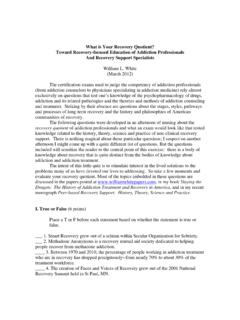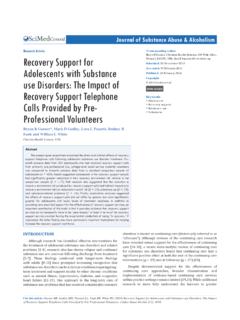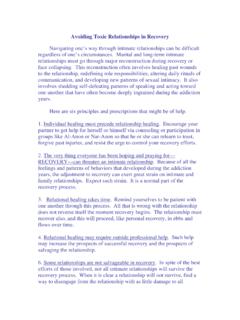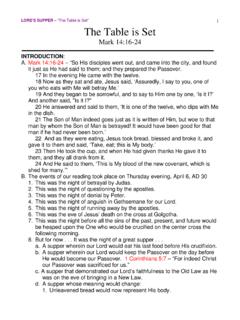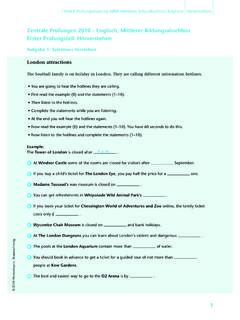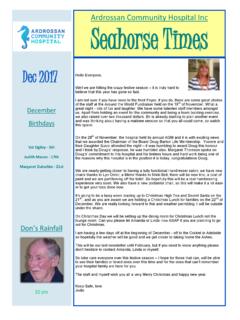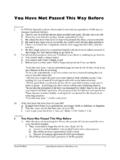Transcription of Young People in Recovery: An Interview with Justin …
1 1 White, W. (2013). Young People in Recovery: An Interview with Justin Luke Riley. Posted at Young People in Recovery: An Interview with Justin Luke Riley William L. White Introduction One of the most important developments within the new addiction recovery advocacy movement has been the recent mobilization of the largest generation of Young People in recovery in history. From landmark films (Greg Williams Anonymous People ) to new organizations ( Young People in Recovery), a growing group of energetic and articulate twenty somethings are bringing new vitality to the recovery advocacy movement. In November 2013, I had the opportunity to Interview Justin Luke Riley about the short history of Young People in Recovery and his vision for this new recovery advocacy organization . Please join us in this engaging conversation. Early History of Young People in Recovery Bill White: Justin , could you share the story of how you came to be involved in recovery advocacy and with Young People in Recovery (YPR)?
2 Justin Luke Riley: Absolutely. First, let me introduce myself to our readers. My name is Justin Luke Riley, and I m a Young person in recovery. For me, that means that I ve learned to be a much better son and an asset to my community, and I m still learning how to be a husband. (I ve only been married for two-and-a-half years.) It also means to me that I ve been alcohol- and other drug-free since November of 2007. In November of 2007, I heard a message that was very simple and clear and that was my need to help others in whatever way I could. And so I began at age 19 to carry the recovery message to let other Young People know that it is okay and even exciting to be in recovery. I was then asked to participate in something that changed my life. It was a government-funded conference in December 2010, and I was asked to share that I was in recovery and how that had happened. I talked about my friends, and how People around me were helping me, my family, and my Nanna and going back to school.
3 At this meeting, there were other Young People who kept saying, We re part of CRC at Rutgers. I finally interrupted and said, I don t know what you mean when you keep saying you re part of CRC. Is that a treatment center? Is that a new AA thing? And they said, No, it s a collegiate recovery community. There s a house on Rutgers University that supports us and our journey to recovery. Some of us go to twelve-step meetings. Some of us just learned a different way to live without abusing substances and so-on-and-so-forth. And I was flabbergasted, Bill. I d never heard of this. I asked them, So basically, it s just like Hogwarts for kids like us who need an alternative environment? And I said, Your campus not only knows your history, but they re supporting you in your recovery? That s amazing to me. 2 Those present included Devin Fox, Daniel Turino, Benjamin Shand, Sarah Nerad, Aaron Hoffman, Mike Deagros, and others who would later play important roles in YPR.
4 Young People in Recovery was really birthed out of the sharing that began at that conference and at a follow-up conference held in July 2011. Bill White: What is your recollection of the early vision or hopes of what YPR could achieve? Justin Luke Riley: We had this vision of empowering Young People , of carrying a message of hope, not proposing we have the best way to recover, not endorsing a certain kind of recovery, but just lifting up all these great things that we d experienced and heard about. After those first two meetings, there were frequent conference calls until 11:00 at night because so many of us obviously were either working or going to school. Those first calls were, Hey, what s happening in your part of the country? type of exchanges. We finally came up with a vision and a mission statement. And we met again in Bethesda with some outside help to do some strategic planning to formalize ourselves as an organization.
5 So many People believed in us: Faces and Voices of Recovery, the National Recovery Foundation, SAMHSA, and the Stacie Mathewson Foundation. Our really big vision is a world where all Young People in or seeking recovery can achieve their potential in life. And we wanted to be as inclusive as possible embracing People in traditional 12-step programs to harm reduction programs and everything in between, from SMART Recovery to the All Recovery Meetings that are becoming more popular among Young People . We wanted to be supportive of any way a Young person could find recovery. Structure and Financing of YPR Bill White: How is YPR currently structured? Justin Luke Riley: Young People in Recovery is incorporated in good standing in the state of Colorado. It is governed by an advisory board made of People from coast to coast some in the addiction recovery field and some who are representatives from foundations or other non-profit organizations.
6 The advisory board meets by conference call each month, at which time the finances and budget are reviewed and plans made for the continuing future of YPR. Our 501(c) 3 status is pending with officers, including a chair and vice-chair of the board of directors and a secretary and treasurer. Like other organizations, we have bylaws and committees. YPR has three staff members, two of which are coming on in a more full-time capacity in January 2014. These positions include the Vice President of Communication filled by Senerchia who s been with YPR a little over a year now, and Douglas Rudolph, who s our Chief Public Policy Officer. They re both wonderful leaders who have volunteered thousands of hours to the cause of Young People in Recovery. makes sure that all chapters know how to recruit volunteers, host a YPR chapter meeting, and manage themselves financially. Doug helps us continue to be aware of all of the rules and the very strict guidelines that distinguish education and advocacy from lobbying.
7 Doug has a meeting with the Office of National Drug Control Policy (ONDCP) at the White House coming up in the next few weeks. We have worked very closely with ONDCP over the last few years. I m the President and CEO of Young People in Recovery and was the Chair of the National Leadership Council before we were fully organized 3 as a non-profit organization. My job is to develop a business model for YPR to assure its sustainability and to meet with the YPR chapters and support them in any way I can. Another person I would like to mention is Devin Fox. He was the trailblazer who carried YPR on his shoulders in our early days. I can confidently say that without Devin Fox, YPR wouldn t be where it is today and might not even still be here. Devin kept us all together in those early days and solidifies our relationships with key organizations. Mike DeAgro, our current Board Chair, also deserves acknowledgement for bringing YPR to its present level of development.
8 Bill White: How has YPR been financially supported? Justin Luke Riley: The way we ve been funded so far is from key partners. SAMHSA paid for us to get together for our early strategic planning and, through Abt Associates, provided the consultants that guided our early organizational efforts. The National Youth Recovery Foundation and Faces and Voices of Recovery both housed us within their umbrella before we became an independent organization. Two foundations the Bridge Foundation and the Stacie Mathewson Foundation have supported us. The Stacie Mathewson Foundation is by far the largest financial supporter we have had to date. YPR Chapters Bill White: You have referenced state and local chapters of YPR. Could you describe the current state of chapter development? Justin Luke Riley: Yes. We now have more than ten chapters. It s a bit tough pinning this number down because there is no ironclad rule of what it takes to be a chapter.
9 We don t say, Hey, if you want to have a chapter, it has to have these five ingredients and if it doesn t, then you can t be a chapter. What we have are suggested guidelines of how different chapters have organized themselves and what types of activities they have pursued. Some of our chapters, like the one here in Denver, Colorado, where I live, are promoting collegiate recovery programs and promoting the development of recovery community centers. The Colorado YPR chapter has a facility where chapter meetings, twelve-step meetings, and All Recovery meetings are held. And they provide some peer-based recovery support services through the Access to Recovery program. The major recovery advocacy organization in Colorado, Advocates for Recovery, is also housed at the YPR facility. In contrast, we have a YPR chapter in Ohio that focuses on sponsoring sober events such as bowling or going to athletic games to help People have a social life in recovery that is not centered around alcohol and drugs.
10 Other chapters have more of a public policy focus. Many of our YPR chapters, such as those in Reno and focus their efforts on supporting their collegiate recovery programs. At the end of the day, the mission of each chapter is to identify, prioritize, and respond to the recovery support needs of Young People in their community. Bill, what that looks like is helping them getting back to college, helping them get jobs, helping them navigate the pre- or post-treatment world, helping them socially integrate and thrive and contribute as a recovering person within the community. 4 What we ve done is turned it all upside down. Rather than having a set program we want everyone to replicate around the country, we are asking local chapters to define what their community needs and then we are supporting them in their efforts to meet those needs. One of the ways we re going to offer that support is to host national leadership conferences every year and develop Young leaders in recovery from across the country and give them opportunities to learn from each other.
